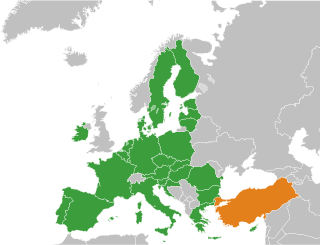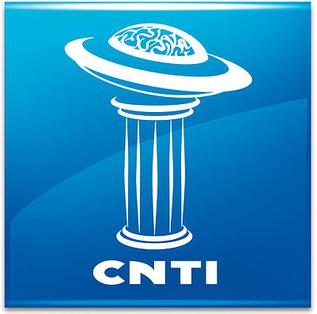The Republic of Cyprus is a unitary presidential representative republic, whereby the President of Cyprus is both head of state and head of government. Executive power is exercised by the government. Legislative power is vested in both the government and the parliament. The Judiciary is independent of the executive and the legislature.

Dialogue is a written or spoken conversational exchange between two or more people, and a literary and theatrical form that depicts such an exchange. As a philosophical or didactic device, it is chiefly associated in the West with the Socratic dialogue as developed by Plato, but antecedents are also found in other traditions including Indian literature.
The Annan Plan, also known as the Cyprus reunification plan, was a United Nations proposal to resolve the Cyprus dispute. The different parts of the proposal were based on the argumentation put forward by each party in meetings held under the auspices of the UN. The proposal was to restructure the Republic of Cyprus to become the "United Republic of Cyprus", a federation of two states. It was revised a number of times before it was put to the people of Cyprus in a 2004 referendum, and was supported by 65% of Turkish Cypriots, but only 24% of Greek Cypriots.

Turkey is negotiating its accession to the European Union (EU) as a member state, following its application to become a full member of the European Economic Community (EEC), the predecessor of the EU, on 14 April 1987.
The International Federation for Information Processing (IFIP) is a global organisation for researchers and professionals working in the field of computing to conduct research, develop standards and promote information sharing.

The Turkish invasion of Cyprus was launched on 20 July 1974, following the Cypriot coup d'état on 15 July 1974.

Nicosia International Airport is a largely disused airport located 8.2 km (5.1 mi) west of the Cypriot capital city of Nicosia in the Lakatamia suburb. It was originally the main airport for the island, but commercial activity ceased following the Turkish invasion of Cyprus in 1974. The airport site is now mainly used as the headquarters of the United Nations Peacekeeping Force in Cyprus.

The English School is a selective secondary school in Nicosia, Cyprus. It has a rigorous selection process for admittance. It is one of the secondary schools in Nicosia designated to be bi-communal, with both Greek and Turkish Cypriots being educated at the school.
Dr. Hasan Özbekhan was a Turkish American systems scientist, cyberneticist, philosopher and planner who was Professor Emeritus of Management at the Wharton School of the University of Pennsylvania. He applied the field-of-systems theory to global problems, helped inspire the group of planners, diplomats, scientists and academics who came together as the Club of Rome.

Alexander (Aleco) Christakis is a Greek American social scientist, systems scientist and cyberneticist, former faculty member of several Universities, organizational consultant and member of the Club of Rome, known for his "study and design of social systems".

A dialogue tree, or conversation tree, is a gameplay mechanic that is used throughout many adventure games and role-playing video games. When interacting with a non-player character, the player is given a choice of what to say and makes subsequent choices until the conversation ends. Certain video game genres, such as visual novels and dating sims, revolve almost entirely around these character interactions and branching dialogues.
Protracted social conflict is a technical term that generally refers to conflicts described by other researchers as protracted or intractable: complex, severe, commonly enduring, and often violent. The term was presented in a theory developed by Edward Azar.

The Union for the Mediterranean is an intergovernmental organization of 42 member states from Europe and the Mediterranean Basin: the 27 EU member states and 15 Mediterranean partner countries from North Africa, Western Asia and Southern Europe. It was founded on 13 July 2008 at the Paris Summit for the Mediterranean, with an aim of reinforcing the Euro-Mediterranean Partnership (Euromed) that was set up in 1995 as the Barcelona Process. Its general secretariat is located in Barcelona, Spain.
The Cypriot S-300 crisis was a tense and rapidly escalating political standoff between the Republic of Cyprus and the Republic of Turkey between early 1997 and late 1998. The confrontation was sparked by Cypriot plans to install two Russian-made S-300 air-defence missile sites on their territory, provoking Turkey into threatening an attack or even all-out war if the missiles were not returned to Russia. The missile deal with Russia represented the Cyprus government's first serious attempt at building a credible air defence system after years of Turkish superiority in the air. The crisis effectively ended in December 1998 with the decision of the Cypriot government to transfer the S-300s to Greece's Hellenic Air Force in exchange for alternative weapons from Greece. The crisis also led to the collapse of Cyprus's coalition government. Greece's Hellenic Air Force installed the system on the island of Crete and as of 2021 the S-300s still operate there.
Technology for Peace (Tech4Peace) is a Cyprus-based peoples' initiative launched in 1995 to serve the needs of peace pioneers on the divided island.

The Cyprus Neuroscience and Technology Institute (CNTI) is a non-profit, non-Governmental independent organization active in programs with future orientation in areas related to human brain-modern technology-social transformation and the repercussions of relevant research for humanity.
The Cyprus Conflict Resolution Trainers Group was founded in 1994 by about 30 Cypriot peace pioneers. Because this group has introduced conflict resolution and structured dialogue concepts to a few thousand Cypriots, it is credited for the formation of an embryonic peace movement.

Future Worlds Center (FWC) is a non-profit, non-Governmental independent organization active in programs with future orientation in areas related to positive social change, social entrepreneurship and transformation.
Spreadthink is a kind of conceptual pathology of groups unable to reach any "genuine consensus, or even majority view toward component aspects of a complex issue". The word was coined by systems researcher and mathematical cybernetician John N. Warfield to describe ineffective thinking in groups. Warfield said that this collective condition is generally neither recognized nor usually compensated for. Spreadthink reflects the fact that any time a group meets to work together on a complex issue using ordinary and familiar group processes, the individuals in the group will not agree on what are the most important sub-issues, and in general will not have a majority view on the merits of any of the many sub-issues.
A joint declaration was made on 11 February 2014 at the start of renewed negotiations to settle the Cyprus dispute. The following talks between Nicos Anastasiades, President of Cyprus, and Derviş Eroğlu, President of Northern Cyprus, were stalled in October 2014.










